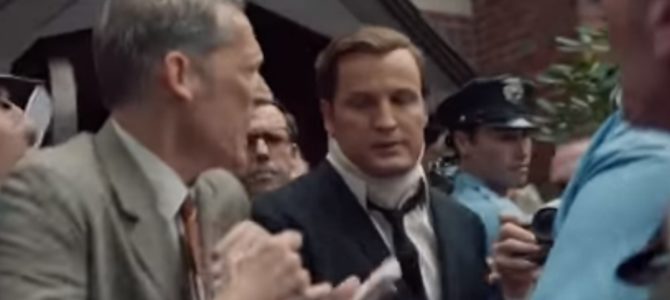
Donald Trump famously bragged during the last presidential campaign that he could stand in the middle of Fifth Avenue and shoot somebody without losing voters. Unless the president actually picks up a pistol to prove that point before 2020, Massachusetts Sen. Ted Kennedy will remain the prime example of a modern politician who retained the support of fanatical forgive-anything followers after committing what should have been considered a capital crime.
In July 1969, Kennedy drove off a bridge, left 28-year-old campaign worker Mary Jo Kopechne to die in his submerged car, then failed to inform police about the event until 10 hours later. Director John Curran’s “Chappaquiddick” focuses on that tragic night and the immediate aftermath of the scandal that should have killed Kennedy’s political career, but instead became an almost black-humor indictment of American politics and certain voters’ gullibility.
What’s refreshing (if not downright amazing) about Taylor Allen and Andrew Logan’s screenplay, based largely on facts from a lengthy 1970 court inquest, is that it fairly recounts the reprehensible episode without any liberal-Hollywood sugarcoating or raging right-wing hysteria. Although there certainly is little to like about the movie’s Kennedy, who is well portrayed by actor Jason Clarke as a self-serving, deceitful embarrassment, the writers evenhandedly refrain from resorting to any needlessly trashy sensationalism.
While scenes such as backroom damage-control strategy sessions at the Kennedy compound are credibly imagined, for example, the writers resist dramatizing any implied adulterous relationship between Kennedy and Kopechne. With so much documented depravity already on the record, there’s no need to go overboard making up any new misdeeds.
Good Judgment Obviously Isn’t This Politician’s Strength
Kate Mara nicely underplays Kopechne as serious and almost resignedly mature. (Mara’s “House of Cards” character Zoe Barnes also ended up getting killed by a politician, which makes for an odd bit of typecasting.) Although Mary Jo and Ted share a late-night conversation after leaving the party on the night she would die, the scene doesn’t descend into unlikely histrionics or lustfully inflamed passion.
Clarke is good at making Ted seem both amorally calculating and arrogantly dimwitted. While his behind-the-scenes handlers try mapping out a response to the escalating crisis that involves keeping the press misinformed and law-enforcement agencies subdued, Ted’s idea of how to gain sympathy for himself is by wearing a laughably large neck brace to Kopechne’s funeral. Everyone tells him it’s a bad idea, but good judgment obviously is not one of the guy’s strong suits.
Bruce Dern is viciously dismissive and coldly calculating as elderly Kennedy patriarch Joe Kennedy, who clearly was disgusted with youngest son Ted long before that fateful night. Instead of Joe’s casual cruelty engendering any audience empathy for Ted, it’s hard to imagine even the most loving father not being bitterly disappointed with the behavior of such a selfish, whining dunce.
The standout supporting player is Ed Helms as Ted’s enabling but conflicted cousin Joe Gargan, the closest thing to a moral center in the whole sordid affair. Horrified when Ted came back to the party that night and told him what happened, Joe and former U.S. attorney for Massachusetts Paul Markham (Jim Gaffigan) returned with Ted to the bridge, and even made unsuccessful attempts to retrieve Kopechne’s body from the car.
Joe urged Ted to contact the police immediately, was assured that he would, and was aghast to learn the next morning that Ted had returned to his hotel without doing so. Police eventually were alerted by fishermen who spotted the overturned car in the water.
What Were Voters Thinking?
Ted’s only opportunity for any possible redemption arrives when he makes a live televised speech about the accident, his part in it, and his plans for the future. Cousin Joe looks on from behind the scenes, desperately hoping Ted will end his remarks the way they agreed. Unfortunately, he also should know Ted too well by then to expect anything noble or decent to come out of his mouth.
Curran is good at keeping the story’s shameful specifics from sinking into pathetic parody, despite the outrageousness of such a truth-is-stranger-than-fiction plot. It boggles the mind to think that even a smugly self-entitled ruling-class Kennedy would believe he could get away with the next best thing to murder by simply walking (and swimming) from the scene of the crime.
It’s even more shocking to realize (spoiler alert for anyone who slept through the past half-century) that he pretty much did exactly that. After receiving only a suspended two-month sentence for pleading guilty to leaving the scene of an accident causing bodily injury, Kennedy was re-elected to the U.S. Senate the following year with 62 percent of the vote. He went on to win the next six elections, remaining in office until his death in 2009.









